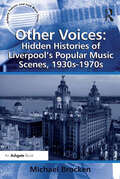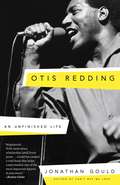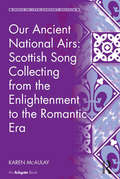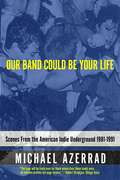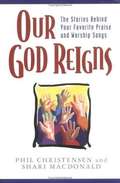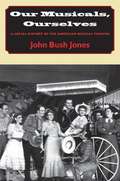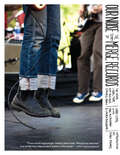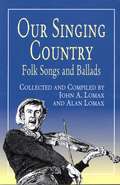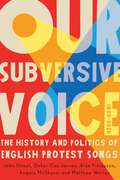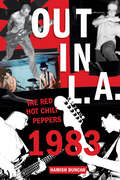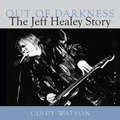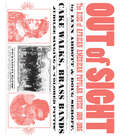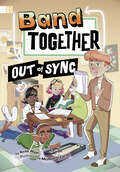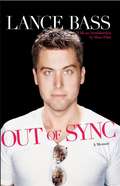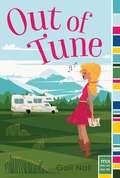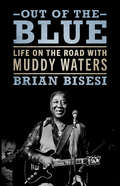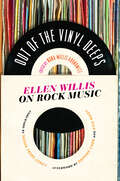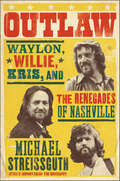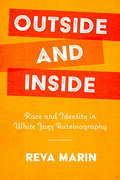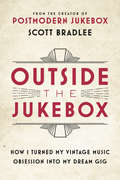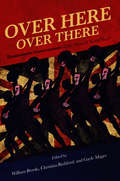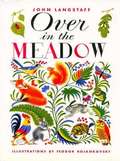- Table View
- List View
Other Voices: Hidden Histories Of Liverpool's Popular Music Scenes 1930s-1970s (Ashgate Popular and Folk Music Series)
by Michael BrockenAt times it appears that a whole industry exists to perpetuate the myth of origin of the Beatles. There certainly exists a popular music (or perhaps 'rock') origin myth concerning this group and the city of Liverpool and this draws in devotees, as if on a pilgrimage, to Liverpool itself. Once 'within' the city, local businesses exist primarily to escort these pilgrims around several almost iconic spaces and places associated with the group. At times it all almost seems 'spiritual'. One might argue however that, like any function myth, the music history of the Liverpool in which the Beatles grew and then departed is not fully represented. Beatles historians and businessmen-alike have seized upon myriad musical experiences and reworked them into a discourse that homogenizes not only the diverse collective articulations that initially put them into place, but also the receptive practices of those travellers willing to listen to a somewhat linear, exclusive narrative. Other Voices therefore exists as a history of the disparate and now partially hidden musical strands that contributed to Liverpool's musical countenance. It is also a critique of Beatles-related institutionalized popular music mythology. Via a critical historical investigation of several thus far partially hidden popular music activities in pre- and post-Second World War Liverpool, Michael Brocken reveals different yet intrinsic musical and socio-cultural processes from within the city of Liverpool. By addressing such 'scenes' as those involving dance bands, traditional jazz, folk music, country and western, and rhythm and blues, together with a consideration of partially hidden key places and individuals, and Liverpool's first 'real' record label, an assemblage of 'other voices' bears witness to an 'other', seldom discussed, Liverpool. By doing so, Brocken - born and raised in Liverpool - asks questions about not only the historicity of the Beatles-Liverpool narrative, but also about the absence o
Otis Redding: An Unfinished Life
by Jonathan GouldThe long-awaited, definitive biography of The King of Soul, timed to coincide with the 50th anniversary of Redding's iconic performance at the 1967 Monterey Pop Festival. Otis Redding remains an immortal presence in the canon of American music on the strength of such classic hits as “(Sittin’ on) The Dock of the Bay,” “I’ve Been Loving You Too Long,” “Try a Little Tenderness,” and “Respect,” a song he wrote and recorded before Aretha Franklin made it her own. As the architect of the distinctly southern, gospel-inflected style of rhythm & blues associated with Stax Records in Memphis, Redding made music that has long served as the gold standard of 1960s soul. Yet an aura of myth and mystery has always surrounded his life, which was tragically cut short at the height of his career by a plane crash in December 1967. In Otis Redding: An Unfinished Life, Jonathan Gould finally does justice to Redding’s incomparable musical artistry, drawing on exhaustive research, the cooperation of the Redding family, and previously unavailable sources of information to present the first comprehensive portrait of the singer’s background, his upbringing, and his professional career. In chronicling the story of Redding’s life and music, Gould also presents a social history of the time and place from which they emerged. His book never lets us forget that the boundaries between black and white in popular music were becoming porous during the years when racial tensions were reaching a height throughout the United States. His indelible portrait of Redding and the mass acceptance of soul music in the 1960s is both a revealing look at a brilliant artist and a provocative exploration of the tangled history of race and music in America that resonates strongly with the present day.
Our Ancient National Airs: Scottish Song Collecting From The Enlightenment To The Romantic Era (Music in Nineteenth-Century Britain)
by Karen McAulayOne of the earliest documented Scottish song collectors actually to go 'into the field' to gather his specimens, was the Highlander Joseph Macdonald. Macdonald emigrated in 1760 - contemporaneously with the start of James Macpherson's famous but much disputed Ossian project - and it fell to the Revd. Patrick Macdonald to finish and subsequently publish his younger brother's collection. Karen McAulay traces the complex history of Scottish song collecting, and the publication of major Highland and Lowland collections, over the ensuing 130 years. Looking at sources, authenticity, collecting methodology and format, McAulay places these collections in their cultural context and traces links with contemporary attitudes towards such wide-ranging topics as the embryonic tourism and travel industry; cultural nationalism; fakery and forgery; literary and musical creativity; and the move from antiquarianism and dilettantism towards an increasingly scholarly and didactic tone in the mid-to-late Victorian collections. Attention is given to some of the performance issues raised, either in correspondence or in the paratexts of published collections; and the narrative is interlaced with references to contemporary literary, social and even political history as it affected the collectors themselves. Most significantly, this study demonstrates a resurgence of cultural nationalism in the late nineteenth century.
Our Band Could Be Your Life: Scenes from the American Indie Underground, 1981-1991
by Michael AzerradThis is the never-before-told story of the musical revolution that happened right under the nose of the Reagan Eighties--when a small but sprawling network of bands, labels, fanzines, radio stations, and other subversives reenergized American rock with punk rock's do-it-yourself credo and created music that was deeply personal, often brilliant, always challenging, and immensely influential. This sweeping chronicle of music, politics, drugs, fear, loathing, and faith has been recognized as an indie rock classic in its own right. Among the bands profiled: Mission of Burma, Butthole Surfers, The Minutemen, Sonic Youth, Black Flag, Big Black, Hüsker Dü, Fugazi, Minor Threat, Mudhoney, The Replacements, Beat Happening, and Dinosaur Jr.
Our God Reigns: The Stories Behind Your Favorite Praise and Worship Songs
by Shari Macdonald Phil ChristensenPresents the stories behind twenty-five well-known worship songs including "I Want to Be Where You Are," "You Are My All in All," and "His Name Is Wonderful." Provides biographical sketches of the songwriters through a number of interviews and describes the major themes in each song.
Our Journey: Rak Su’s Official Autobiography. The X Factor Winners
by Rak-SuA shout-out to all fans of Rak-Su - this is their story, from where it all began to where they are now, full of exclusive stories and pictures. Make it a special day. Make it a Rak-Su day! __________Rak-Pack! Are you ready for our official story?As long as we've been friends, we've been creating our unique sound of soul, R'n'B, Hip-Hop, Latin and Caribbean music.Keeping the momentum going from our X-Factor journey, we are now performing at sold-out arenas, making more music and having fun!So why not join us on the adventure? Unrivalled access to never-before-seen photos, intimate stories, and behind-the-scenes info - in our first and only memoir!_________Ashley, Jamaal, Myles and Mustafa shot to stardom in 2017 as the first ever male group to win the X-Factor. Since then, the soulful boys have been topping the charts with their eclectic sound, performing at sold-out arenas, touring with global sensation Little Mix, recording their first album and most recently dropping their brand new hit single, Pyro Ting.Join Rak-Su on their journey from ordinary North-West London lads, to victors of one of the world's biggest talent shows in their one and ONLY! OFFICIAL memoir, Our Journey.
Our Musicals, Ourselves: A Social History of the American Musical Theatre
by John Bush JonesOur Musicals, Ourselves is the first full-scale social history of the American musical theater from the imported Gilbert and Sullivan comic operas of the late nineteenth century to such recent musicals as The Producers and Urinetown. While many aficionados of the Broadway musical associate it with wonderful, diversionary shows like The Music Man or My Fair Lady, John Bush Jones instead selects musicals for their social relevance and the extent to which they engage, directly or metaphorically, contemporary politics and culture. <P><P>Organized chronologically, with some liberties taken to keep together similarly themed musicals, Jones examines dozens of Broadway shows from the beginning of the twentieth century to the present that demonstrate numerous links between what played on Broadway and what played on newspapers' front pages across our nation. He reviews the productions, lyrics, staging, and casts from the lesser-known early musicals (the gunboat musicals of the Teddy Roosevelt era and the Cinderella shows and "leisure time musicals" of the 1920s) and continues his analysis with better-known shows including Showboat, Porgy and Bess, Oklahoma, South Pacific, West Side Story, Cabaret, Hair, Company, A Chorus Line, and many others. While most examinations of the American musical focus on specific shows or emphasize the development of the musical as an art form, Jones's book uses musicals as a way of illuminating broader social and cultural themes of the times. With six appendixes detailing the long-running diversionary musicals and a foreword by Sheldon Harnick, the lyricist of Fiddler on the Roof, Jones's comprehensive social history will appeal to both students and fans of Broadway.
Our Noise: The Story of Merge Records, the Indie Label That Got Big and Stayed Small
by John Cook Laura Ballance Mac McCaughanMerge Records defies everything you’ve heard about the music business. Started by two twenty-year-old musicians, Merge is a lesson in how to make and market great music on a human scale. The fact that the company is prospering in a failing industry is something of a miracle. Yet two of their bands made the Billboard Top 10 list; more than 1 million copies of Arcade Fire's Neon Bible have been sold; Spoon has appeared on Saturday Night Live and The Tonight Show; and the Magnetic Fields' 69 Love Songs is a contemporary classic. In celebration of their twentieth anniversary, founders Mac and Laura offer first-person accounts—with the help of their colleagues and Merge artists—of their work, their lives, and the culture of making music. Our Noise also tells the behind-the-scenes stories of Arcade Fire, Spoon, the Magnetic Fields, Superchunk, Lambchop, Neutral Milk Hotel, and Butterglory. Hundreds of personal photos of the bands, along with album cover art, concert posters, and other memorabilia are included.
Our Singing Country: Folk Songs and Ballads
by John A. Lomax Alan LomaxThis sequel to the Lomaxes' widely acclaimed American Ballads and Folk Songs includes melodies and words for tunes from all parts of the country. Songs include spirituals, hollers, game songs, lullabies, courting songs, chain-gang work songs, Cajun airs, breakdowns, and many more. Judith Tick, a scholar and award-winning author, provides a new fact-filled Introduction; notes on tune origins, two indexes, and an extensive bibliography round out this archive of some 200 authentic folk songs and ballads.
Our Subversive Voice: The History and Politics of English Protest Songs, 1600–2020 (McGill-Queen's Studies in Protest, Power, and Resistance)
by John Street Oskar Cox Jensen Alan Finlayson Angela McShane Matthew WorleyWhether accompanying a march, a sit-in, or a confrontation with police, songs and protest are inextricably linked. As a tool for political activism, the protest song spells out the issues at the heart of each cause. Over a surprisingly long history, it has been used to spread ideas, inspire political imagination, and motivate political action.The protest song is - and has always been - a form of political oratory as vital to political representation as it is to performance. Investigating five centuries of English history, Our Subversive Voice establishes that the protest song is not merely the preserve of singer-songwriters; it is a mode of political communication that has been used to confront many systems of oppression across its many genres, from street ballads to art song, grime to hymns, and music hall to punk. Our Subversive Voice traces the history of the protest song, examines its rhetorical forms, and explores the conditions of its genesis. It recounts how these songs have addressed discrimination and inequality, exploitation and the environment, and immigration and identity, and how institutions and organizations have sought both to facilitate and to suppress them. Drawing on a large and diverse corpus of songwriters, this book argues that song does more than accompany protest: it choreographs and communicates it.The protest song, Our Subversive Voice shows, is an enduring, affecting, and effective means of expression and an essential element in understanding the drive to create political change, in the past and for the future.
Our World: Our OFFICIAL autobiography
by Little MixCelebrate Little Mix's first UK number-one album - Glory Days - by reading the full story of the girls' astonishing rise to pop super stardom. Our World is full of exclusive photos and inspirational stories about Jade, Perrie, Jesy and Leigh-Anne's unique friendship.Little Mix are the UK's most successful girl band. They first found fame - and each other - on The X Factor in 2011. Five years later they have gone from strength to strength, achieving huge global success. With three platinum-selling albums in the UK and over 14 million record sales worldwide, the band are both adored by their fans and critically acclaimed for their brilliant music. In this book the girls share the real behind-the-scenes story of both their personal lives and their success. They reveal the many highs - what it feels like to perform in front of thousands of people; the excitement of seeing your music soar to Number One around the world - but also the lows. Through it all the girls have had each other, and their incredibly close friendship has grown stronger and stronger as the years have gone by. Now the girls are like sisters, and in this book they share their journeys and how it feels for your dreams to come true.Brimming with exclusive photos, this book shares with us the girls' innermost secrets - their hopes and dreams for the future, their families, their relationships, their style advice and above all their friendship. This book is Little Mix's story in their own words and tells you everything you need to know about their lives both in and out of the spotlight.
Out in L.A.: The Red Hot Chili Peppers, 1983
by Hamish DuncanThe Red Hot Chili Peppers were going to be a one-time act for a friend's album release party. Forty years later the funk rock band is arguably one of the best known and the longest running in the United States. Everything that happened in 1983 set the course for the rest of the band's career. The scrappy band quickly rose to scene-wide fame, playing all over Los Angeles and gaining fans and media attention wherever they performed. Before the year was out, they had played approximately thirty shows, put together an early, beloved repertoire, recorded a blistering demo that secured them a recording contract with EMI/Enigma, and lost two of their founding members to a rival band.Out in L.A. is an attempt at finding out exactly what happened during that first year and exploring what it is that makes the Red Hot Chili Peppers so compelling and fresh, even as they continue on their musical journey today.
Out of Darkness: The Jeff Healey Story
by Cindy Watson<P>Short-listed for the 2011 Golden Oak Award <P>From the moment three-year-old Jeff Healey first laid a guitar across his lap in what was to become his signature style, it was clear he was no ordinary kid. <P>Losing both eyes to retinoblastoma, a rare form of cancer, opened a door to another world for Jeff, a newly adopted infant. <P>Out of darkness he created music, becoming one of the most influential blues-rock and jazz performers of our time, beginning with his first hit album, See the Light. <P> In this up-close and personal account, loaded with never-before-seen photographs, memorabilia, and intimate recollections of family, friends, and fellow musicians, we discover this unique music icon’s dynamic career, which saw him collaborate with everyone from George Harrison and Eric Clapton to B.B. King and Stevie Ray Vaughan. <P>From Jeff’s lonely start one snowy night at St. Joseph’s Hospital in Toronto to his untimely end in the same building, we come away with a potent message of empowerment and a renewed sense of hope.
Out of Sight: The Rise of African American Popular Music, 1889–1895 (American Made Music Series)
by Lynn Abbott Doug SeroffA landmark study, based on thousands of music-related references mined by the authors from a variety of contemporaneous sources, especially African American community newspapers, Out of Sight examines musical personalities, issues, and events in context. It confronts the inescapable marketplace concessions musicians made to the period’s prevailing racist sentiment. It describes the worldwide travels of jubilee singing companies, the plight of the great Black prima donnas, and the evolution of “authentic” African American minstrels. Generously reproducing newspapers and photographs, Out of Sight puts a face on musical activity in the tightly knit Black communities of the day. Drawing on hard-to-access archival sources and song collections, the book is of crucial importance for understanding the roots of ragtime, blues, jazz, and gospel. Essential for comprehending the evolution and dissemination of African American popular music from 1900 to the present, Out of Sight paints a rich picture of musical variety, personalities, issues, and changes during the period that shaped American popular music and culture for the next hundred years.
Out of Sync (Band Together)
by Keith WainLewis writes songs and sings. That’s his main job in the band. So what will happen to the band when Lewis stops writing and singing?
Out of Sync: A Memoir
by Marc Eliot Lance BassAt sixteen, Lance Bass received a phone call from Justin Timberlake that would change his life forever. Soon after, he left his small-town home in Clinton, Mississippi, to join an emerging musical group called *NSYNC. Two years later *NSYNC was inspiring Beatles-esque mania around the world, becoming the face of the new MTV generation, and earning the all-time record for most album sales in a single day (more than one million) and in a single week for No Strings Attached. He's remained in the spotlight ever since, and here he talks in depth for the first time about his childhood, his astonishing experiences as a young man and Christian growing up in one of the biggest bands in the world, his shock and frustration at the band's eventual dissolution, and his subsequent career, including his four months in Russia, training to become a cosmonaut. He also frankly discusses life as a gay man -- his first same-sex relationship at twenty-one, his struggle to keep his sexuality hidden from *NSYNC's fans in case it jeopardized the band's success, and the true circumstances that led to his decision to publicly come out at the age of twenty-seven. Full of fascinating behind-the-scenes lore and revealing insights from a pop star who, until now, has been notoriously private, Out of Sync is the book that millions of fans have been waiting for.
Out of Tune
by Gail NallA country music hopeful puts her Nashville dreams on hold when she moves into an RV to travel across the country with her family in this charming new novel from the author of Breaking the Ice.When twelve-year-old Maya's parents sell their house and move the family into the world's ugliest RV to travel the country, Maya's only goal is to get back home--and fast. No way is she going to miss the chance to audition for Dueling Duets, the singing competition show that's going to surely propel her--and her cowboy-hatted crush--to country stardom. Operation Maya Goes Home, or OMGH, turns out to be more complicated than she had expected, so Maya sets out on a secret one-day, one-hundred-mile bike ride through Yellowstone National Park with her know-it-all little sister, a cute nature boy, and blue-haired, earbud-addicted Shiver (a.k.a. the most annoying girl ever). Somewhere between the worst muscle ache she's ever experienced and losing half of their group to a flat tire, Maya starts wondering if maybe, just maybe, it's possible to find home in the last place you expected.
Out of the Blue: Life on the Road with Muddy Waters (American Made Music Series)
by Brian BisesiOut of the Blue: Life on the Road with Muddy Waters begins with a moment lifted from a young musician’s dreams. Brian Bisesi, a guitarist barely out of his teens, is invited on stage to fill in for a missing member of the band backing blues legend Muddy Waters. This life-changing quirk of fate opens the door into a world of challenges and opportunities that Bisesi, an Italian American reared in the comforts of a New York City suburb, can barely imagine. Despite their differences, Bisesi and Waters hit it off, and what might have been a one-night stand turns into a career. From 1978 to 1980, Bisesi works for Waters as his road manager, bean-counter, and at times his confidant, while often sitting in with the band. Bisesi’s years with the band take him to Europe, Japan, Canada, and across the United States as Waters tours—and parties—with rock gods like Eric Clapton, the Rolling Stones, a Beatle, and the gamut of musicians who came of age with Waters and introduced a younger generation to the blues. In Out of the Blue, Bisesi captures it all: from the pranks and tensions among bluesmen enduring a hard life on the road, to observations about Waters’s technique, his love of champagne and reefer, his eye for women, and his sometimes-acrid views of contemporary music. Bisesi has sharp insights into the ill-conceived management decisions that led to the dissolution of Waters’s longest-serving band in June of 1980. This book will rivet, amuse, and occasionally infuriate blues aficionados. It is a raucous and intimate portrait of the blues scene at a pivotal moment in time that fascinates music historians and blues fans alike.
Out of the Vinyl Deeps: Ellen Willis on Rock Music
by Daphne Carr Evie NagyIn 1968, the New Yorker hired Ellen Willis as its first popular music critic. Her column, Rock, Etc., ran for seven years and established Willis as a leader in cultural commentary and a pioneer in the nascent and otherwise male-dominated field of rock criticism. As a writer for a magazine with a circulation of nearly half a million, Willis was also the country&’s most widely read rock critic. With a voice at once sharp, thoughtful, and ecstatic, she covered a wide range of artists—Bob Dylan, The Who, Van Morrison, Elvis Presley, David Bowie, the Rolling Stones, Creedence Clearwater Revival, Joni Mitchell, the Velvet Underground, Sam and Dave, Bruce Springsteen, and Stevie Wonder—assessing their albums and performances not only on their originality, musicianship, and cultural impact but also in terms of how they made her feel. Because Willis stopped writing about music in the early 1980s—when, she felt, rock &’n&’ roll had lost its political edge—her significant contribution to the history and reception of rock music has been overshadowed by contemporary music critics like Robert Christgau, Lester Bangs, and Dave Marsh. Out of the Vinyl Deeps collects for the first time Willis&’s Rock, Etc. columns and her other writings about popular music from this period (includingliner notes for works by Lou Reed and Janis Joplin) and reasserts her rightful place in rock music criticism. More than simply setting the record straight, Out of the Vinyl Deeps reintroduces Willis&’s singular approach and style—her use of music to comment on broader social and political issues, critical acuity, vivid prose, against-the-grain opinions, and distinctly female (and feminist) perspective—to a new generation of readers. Featuring essays by the New Yorker&’s current popular music critic, Sasha Frere-Jones, and cultural critics Daphne Carr and Evie Nagy, this volume also provides a lively and still relevant account of rock music during, arguably, its most innovative period.
Outlaw: Waylon, Willie, Kris, and the Renegades of Nashville
by Michael StreissguthA “compulsively readable” history of how Waylon Jennings, Willie Nelson, and Kris Kristofferson redefined country music (Publishers Weekly, starred review).Outlaw delves into the country music scene of the late ’60s and early ’70s, when three rebels—Waylon Jennings, Willie Nelson, and Kris Kristofferson found themselves in Music City writing songs and vying for record deals. Channeling the unrest of the times, all three Country Music Hall of Famers resisted the music business’s unwritten rules and emerged as leaders of the outlaw movement that ultimately changed the recording industry. This account offers a broad portrait of the outlaw movement in Nashville that includes a diverse secondary cast of characters, such as Johnny Cash, Rodney Crowell, Kinky Friedman, and Billy Joe Shaver, among others.With archival photographs throughout, Outlaw is a comprehensive examination of a fascinating shift in country music, and the three unbelievably talented musicians who forged the way.“[An] engaging cultural history . . . a fascinating chronicle.” —The Washington Post“Riveting.” —The Wall Street Journal
Outside and Inside: Race and Identity in White Jazz Autobiography (American Made Music Series)
by Reva MarinOutside and Inside: Representations of Race and Identity in White Jazz Autobiography is the first full-length study of key autobiographies of white jazz musicians. White musicians from a wide range of musical, social, and economic backgrounds looked to black music and culture as the model on which to form their personal identities and their identities as professional musicians. Their accounts illustrate the triumphs and failures of jazz interracialism. As they describe their relationships with black musicians who are their teachers and peers, white jazz autobiographers display the contradictory attitudes of reverence and entitlement, and deference and insensitivity that remain part of the white response to black culture to the present day. Outside and Inside features insights into the development of jazz styles and culture in the urban meccas of twentieth-century jazz in New Orleans, Chicago, New York, and Los Angeles. Reva Marin considers the autobiographies of sixteen white male jazz instrumentalists, including renowned swing-era bandleaders Benny Goodman, Artie Shaw, and Charlie Barnet; reed instrumentalists Mezz Mezzrow, Bob Wilber, and Bud Freeman; trumpeters Max Kaminsky and Wingy Manone; guitarist Steve Jordan; pianists Art Hodes and Don Asher; saxophonist Art Pepper; guitarist and bandleader Eddie Condon; and New Orleans–style clarinetist Tom Sancton. While critical race theory informs this work, Marin argues that viewing these texts simply through the lens of white privilege does not do justice to the kind of sustained relationships with black music and culture described in the accounts of white jazz autobiographers. She both insists upon the value of insider perspectives and holds the texts to rigorous scrutiny, while embracing an expansive interpretation of white involvement in black culture. Marin opens new paths for study of race relations and racial, ethnic, and gender identity formation in jazz studies.
Outside the Jukebox: How I Turned My Vintage Music Obsession into My Dream Gig
by Scott BradleeFrom the creator of the sensation Postmodern Jukebox--with millions of fans globally--comes an inspirational memoir about discovering what you love and turning it into a creative movement. With student loan debt piling up and no lucrative gigs around the corner, Scott Bradlee found himself in a situation all too familiar to struggling musicians and creative professionals, unsure whether he should use the little income he had to pay the rent on his basement apartment on the fringes of New York City or to avoid defaulting on his loans. It was under these desperate circumstances that Bradlee began experimenting, applying his passion for jazz, ragtime, and doo wop styles to contemporary hits by singers like Macklemore and Miley Cyrus--and suddenly an idea was born. The bands Bradlee went on to launch--from A Motown Tribute to Nickelback to Postmodern Jukebox, the rotating supergroup devoted to period covers of pop songs for which he is best known--borrowed from and refined the initial idea he had arrived at to bring genres now sometimes considered arcane to wide audiences. Today, the success he has had is astonishing, with Postmodern Jukebox collecting upwards of three million subscribers on YouTube, selling out major venues around the world, and developing previously unknown talent into superstar singers. Taking readers through the false starts, absurd failures, and unexpected breakthroughs of Bradlee's journey from a lost musician to a musical kingmaker headlining Radio City Music Hall--and presenting all the insights he learned along the way to becoming an entrepreneur like no other--OUTSIDE THE JUKEBOX is an inspiring memoir about how one musician found his rhythm and launched a movement that would forever change how people make, distribute, and enjoy their favorite songs.
Over Here, Over There: Transatlantic Conversations on the Music of World War I
by William Brooks Christina Bashford Gayle MageeDuring the Great War, composers and performers created music that expressed common sentiments like patriotism, grief, and anxiety. Yet music also revealed the complexities of the partnership between France, Great Britain, Canada, and the United States. At times, music reaffirmed a commitment to the shared wartime mission. At other times, it reflected conflicting views about the war from one nation to another or within a single nation.Over Here, Over There examines how composition, performance, publication, recording, censorship, and policy shaped the Atlantic allies' musical response to the war. The first section of the collection offers studies of individuals. The second concentrates on communities, whether local, transnational, or on the spectrum in-between. Essay topics range from the sinking of the Lusitania through transformations of the entertainment industry to the influenza pandemic.Contributors: Christina Bashford, William Brooks, Deniz Ertan, Barbara L. Kelly, Kendra Preston Leonard, Gayle Magee, Jeffrey Magee, Michelle Meinhart, Brian C. Thompson, and Patrick Warfield
Over in the Meadow
by John LangstaffA presentation of an old counting rhyme about meadow animals and their activities.
Over the Influence: A Memoir
by Joanna "JoJo" LevesqueA breathtakingly candid memoir by Joanna "JoJo" Levesque, the chart-topping, multi-platinum recording artist behind hits like &“Leave (Get Out),&” &“Too Little, Too Late&”, and the Grammy Award-winning "Say So" Signed to a major recording deal at just 12 years old, JoJo catapulted to the top of the pop-and-R&B-infused charts in the mid 2000's. The relatability of her youth and the appeal of her cool-girl mystique earned her millions of fans around the world. JoJo was an undeniable superstar and pop culture fixture, spanning roles in major studio films, omnipresence on Top 40 radio, frequenting magazine covers, and appearing on national TV. Then, out of the blue, everything came to a halt and JoJo seemingly stepped out of the spotlight, leaving many fans to wonder: What happened to JoJo? In OVER THE INFLUENCE, JoJo holds nothing back as she brings her against-the-odds story of adversity and triumph to center stage. From being raised by parents who were both battling addiction and depression, to emerging victorious in a never-ending lawsuit with her record label, to putting the fragmented pieces of herself together after a maddening period of rebellion and self-betrayal, she takes the reader through the turbulent years that led her to where she is now: releasing new music under her own imprint, performing in shows and festivals around the world, headlining a Broadway show, and beyond. In this raw, behind-the-scenes look at her life, both personal and professional, JoJo&’s unflinching vulnerability allows readers to connect with her on a whole new level through stories of success, heartbreak, redemption, and resilience. More than a victory lap from an artist with over two decades in an ever-changing entertainment industry, OVER THE INFLUENCE is an unapologetic rallying cry to anyone who&’s ever been terrified to fail and still said, &“Count me in.&”
